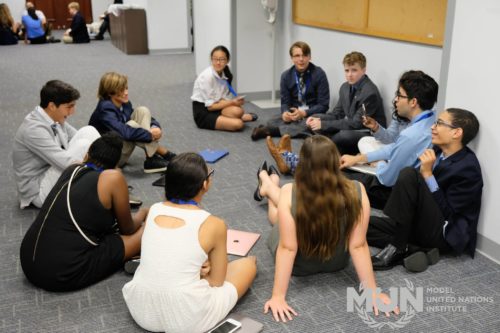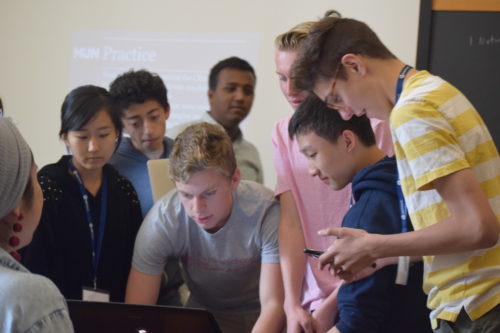The first night of Model UN conferences can be terrifying to delegates with any background of experience. You will (most likely) not know your chairs and fellow delegates, which can be scary in the sense that committee dynamics will be unique and unpredictable. Not to mention, the actions you take on the first night dictate your first impression to the chairs and delegates alike. However, just because a new committee means new circumstances does not mean there are no steps to help you navigate uncharted waters. Here are some steps to take to make sure you enter the second committee session on the right foot.

Establish Connections
In Model UN, nothing good is gained from making enemies. Whether you’re trying to pass a motion, obtain signatories, or vote on a resolution, having good relationships with many delegates in your committee will always work in your favor. Therefore, making good impressions and connecting with as many delegates as possible during the first committee session is an important step to setting yourself up for later success.
Establishing connections begins prior to the start of committee. After setting down your belongings, join the groups of delegates socializing before roll call. Or, look to your left and right to start conversations: get to know the people you’ll be spending the majority of the weekend debating and collaborating with. In doing so, take a genuine interest in who you talk to. Where are they from? How did they get to the conference? What other hobbies do they have other than Model UN? Above all, make sure to steer clear of conversation topics focusing on Model UN: your country’s stance, potential solutions, asking for support on your future working paper. The point of talking to other delegates before committee is to build personal connections that last beyond the scope of committee.
Continue introducing yourself by passing notes to other delegates during opening speeches. Begin your note by complimenting delegates on something unique about their speech: perhaps their speaking style was especially clear or they had a great introduction. Then, address their country stance and compare it with your own in order to explain why your delegations should work together. Your goal is to create a line of communication with as many delegates as possible. After the first note, suggest to meet somewhere during an unmoderated caucus to hear more about their ideas.
For more information, make sure to take a look at this guide on note-passing.

Obtain Contact Information
The first unmoderated caucuses of any conference may seem daunting because many delegates clamor for a second of speaking time in large blocs. However, it is easily forgotten that committee dynamics and blocs are not set in stone after those first couple unmods. In fact, as many experienced delegates can recount, the largest blocs in the room rarely stay intact after a few committee sessions. Therefore, in order to keep your bloc members “in the loop” and bring in other interested delegates that you may not have had a chance to talk to in person, make an effort to collect contact information.
An easy way to obtain contact information is to pass a legal pad around with a table that asks for the delegate’s country and their phone number or email. This information is critical when it comes to coordinating the creation of a bloc on the first night. Just like the goal of passing notes, collecting contact information is a way to open a line of communication to a potential bloc member.
Reach Out
This next step takes place after the end of the first committee session. Once you get back to your hotel room or wherever you stay after committee, begin reaching out to delegates with similar stances. Use the contact information you collected during the first session to do so. These delegates may be the ones you talked with during an unmoderated caucus, but do not confine yourself to only contacting them. Remember — there are most likely many delegates that would be happy to work with you, but simply did not get the chance to interact with you during committee. Use your contact information not only to cement the relations you made while talking to those you had conversations with in person, but also to expand the membership of your bloc.
Ask these delegates what specific solutions their country is especially interested in and whether they see their stance aligns with the solutions you proposed in committee. If so, tell them that you would be happy to work with them and get them involved in the process of writing a working paper. As a way to stay organized, feel free to note down which delegates are writing the clauses for a specific solution.
Depending on your personal preference, reaching out to others can look different. Some delegates prefer to individually call the people on their contact lists while others prefer to make a group chat with invested members of their bloc. Still others have better experiences with texting delegates or creating joint Google Docs to draft out their working papers. Each method differs in the degree of control over bloc relations you gain, as well as the bloc environment you foster.

Write a Working Paper
Last but most definitely not least, begin drafting your working paper. Though this process can be tedious and may involve staying up late to finish, the quality and length of your working paper is one of the few factors in Model UN that a delegate can control. The delegates in your committee, your chair, committee topic, and the countries proposing similar solutions are important aspects of MUN that are out of your hands. Therefore, take advantage of the opportunity to write a large portion of your working paper! Not to mention, a working paper that is clearly well thought out and has research backing it may attract delegates from other blocs that hold similar stances. Even more, a working paper written with great detail may give you more leverage in future negotiations related to merging with other blocs.
In the end, while there are good reasons to feel jittery before committee starts, keep in mind that bloc dynamics are not set after the first session. If being the center of attention does not come naturally to you, focus on establishing friendly relations with everyone in your committee, no matter others’ country stances. Get contact information so you can talk to people one-on-one after committee, when other delegates can’t interrupt or pull people away. Begin writing your working paper so that during committee the next day, you can work on speaking instead of diverting your attention from moderated caucuses to write clauses. The key to preparing yourself for later sessions is focusing on fostering good relationships and what you can control in an unfamiliar environment!


